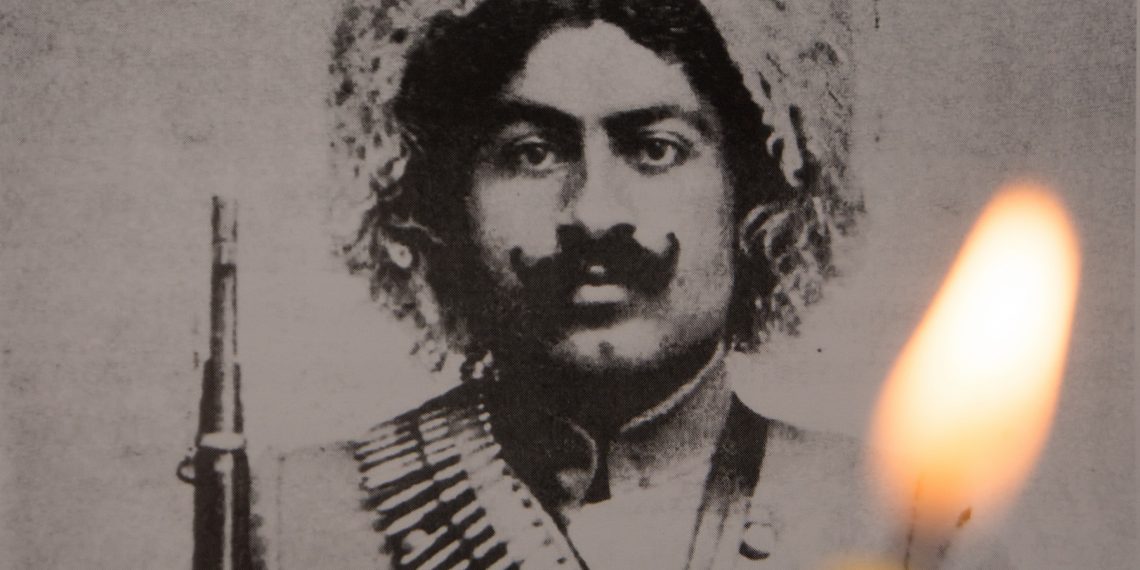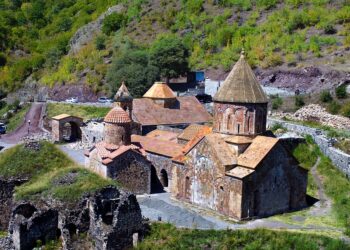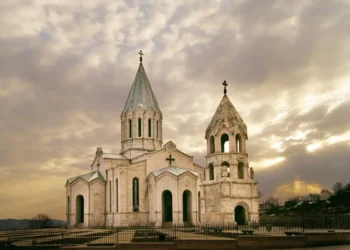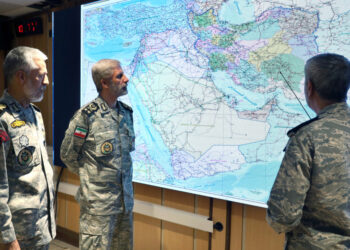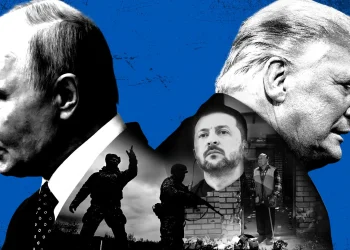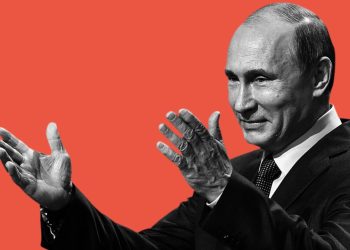YEREVAN (Realist English). Against the backdrop of the events taking place between Russia and the Ukraine, the topic of fascism has become more relevant than ever before in the last 77 post-war years. This author is in no way going to justify or denigrate the hero of today’s narrative and relies only on facts. It was for them that I went to Bulgaria to shed light on the biography of a man who is a national hero for some, an enemy of the nation for others. Who is he, Garegin Nzhdeh?
Let’s take a look.
The First World War
For me personally, there is only one holiday a year — the Victory Day.
It so happened that as a child I was caressed by grandparents, including the neighbors’. Almost all of them took part in the Great Patriotic War. They told many different stories about that war. Their guidance was: “God forbid relive this.” From that childhood, I have my deep respect for older people. I don’t even want to call them aged. I don’t like this word, derived from “age”… So, if there was even a drop of doubt in me about the activities of Garegin Nzhdeh, not only would I not write about him, but I would not “kill” my money and time to go to Bulgaria for the truth. And here’s why. Garegin Nzhdeh died in 1955 in the Soviet city of Vladimir.
However, as you probably noticed, they started talking about him as a negative character quite recently. For no particular reason, he was accused of Nazism, collaboration with Hitler, the Holocaust, of collaboration with Hitler, for Holocaust. And some nine years ago, in 2013, the eponymous film “Nzhdeh” was released to the screens of Russia, with the participation of famous actors, including Chulpan Khamatova, Mikhail Efremov, Frida York … The main character of the picture, Nzhdeh, was shown as a positive hero, like Chapaev. And the movie could be seen in the cinemas in Russia. Where did the wind suddenly start blow from, and how the Armenian “Chapaev” suddenly became demonized? I will open a “secret”: this “wind” has the exact date — October 11, 2019. The place of action is Ashgabat. On this day, Azerbaijani dictator Ilham Aliyev spoke about Nzhdeh at a meeting of CIS heads of state, accusing him of all Nazi sins — anti-Semitism to the creation of Wehrmacht battalions. Since then, it has started! And the Russian media began to gnaw on the topic thrown up, not particularly going into the details of the identity of Nzhdeh, ignoring the theses and facts.
The Aliyev propagandists from Baku understood the hint of their leader and began to offer substantial sums to their Russian colleagues. Well, and those, in turn, started to propagate Baku’s lies from Kaliningrad to Kamchatka. It is curious that the Jews themselves have never heard of Nzhdeh. For example, in Israel there is a list of all Nazi criminals directly or indirectly connected with the extermination of Jews. This list is located in the holy of holies of Israel — Yad Vashem. But there is neither the pseudonym of Nzhdeh nor the real surname of Garegin Ter-Harutyunyan in it.
In this Yad Vashem Memorial Complex there is also a “Garden of the Righteous of the World”, where the names of representatives of different nations who saved Jews are listed. Among them are 24 Armenian saviours and “zero” Azerbaijanis. It turns out that Jews remember both the good and the bad. Not a single name is forgotten. From this logical chain, we find the main link that benefits from denigrating the name of Garegin Nzhdeh — Azerbaijan. Then the question is “why?”. And here an interesting picture from the past emerges. At the beginning of the 20th year of the last century, exactly one hundred years ago, almost the same situation occurred in Armenia as it is now. Not only had the Turks committed a terrible atrocity against the Armenians five years earlier, but the Caucasian Tatars (today’s Azerbaijanis), with the help of the Bolsheviks, were going to bite off Artsakh and Syunik from Armenia. AKA Karabakh and Zangezur. And if afterwards The Bolsheviks handed Karabakh over to Azerbaijan, then Nzhdeh’s detachment defended Zangezur. On May 4, 1920, the Georgian newspaper of the Social Democrats wrote in the newspaper “Struggle” the following: “The program of the Pan-Turkist-Bolshevik bloc is being implemented. The corridor between Soviet Russia and Anatolia is being laid across the lands of Armenia. The principle of self-determination of peoples was once again trampled by the Bolsheviks, since no one thought to ask the population of Zangezur and Karabakh how they themselves want to determine their fate.”
Deja vu? Exactly. A hundred years ago, Garegin Nzhdeh preserved Zangezur, which later remained in Soviet Armenia. Azerbaijan is taking revenge on the remains of Nzhdeh for this. After all, it is his “fault” that the Armenian Nakhichevan, annexed to the Azerbaijan SSR, has become an enclave for modern Azerbaijan, divided by Zangezur. Turkey and Azerbaijan are now tearing and tearing at the pan-Turkist corridor in news reports. That’s why the name of Nzhdeh popped up in their heads and tongues.
It is known that Nzhdeh fought against the imposition of Bolshevism and pan-Turkism. And when Armenia became a Soviet republic, Garegin Nzhdeh had no choice but to leave the USSR without becoming the owner of a Soviet passport. His Armenia was torn apart. His Homeland, Nakhichevan, together with Karabakh, has been transferred to Azerbaijan. Although Nzhdeh left his homeland, he continued to fight. Only this time in the Balkans. It would be appropriate to recall the following: as a citizen of the Russian Empire and a Russian officer, Nzhdeh was a danger for the Turks. He proved himself a hero during the First World War on the side of Russia against Turkey. For which he was awarded by Tsarist Russia with five orders — St. Anna IV art., St. George Crosses II and III art., Imperial Orders of St. Stanislaus and the Imperial Order St. Vladimir. This suggests that such orders were awarded with the personal signature of the Emperor. In this case, the Emperor Nicholas II. And he, as we know, is canonized by the Russian Orthodox Church.
It turns out that the “caviar-eaters” cross themselves with one hand, standing in front of the image of the royal family, and with the other hand they disown these same holy royal passion-bearers? However!
The Second World War
In 1912-13, Nzhdeh fought in the Balkans on the side of the Bulgarians, where he gathered a company of Armenian soldiers against the Turkish army. In this war, he also distinguished himself with bravery, for which he became a hero of Bulgaria and was awarded the Order “For Bravery”. Bulgaria has become a second homeland for him. That’s why he went there, after leaving the USSR, received the passport of a Bulgarian citizen, refusing the passport of the no longer existing Russian Empire. Was Nzhdeh a collaborator? Let’s look into the dictionary: “Collaboration is conscious, voluntary and deliberate cooperation with the enemy, in the enemy’s interests and to the detriment of one’s own state.” An important sentence here is “to the detriment of one’s own state.” But as we know, Nzhdeh was not a citizen of the USSR. So he was not a collaborator.
Let’s say! But did he really cooperate with Hitler during World War II? Bulgaria, whose citizen was Garegin Ter-Harutyunyan was an ally of Hitler, and in deeds the Bulgarian servicemen did not differ much from the German ones. Nzhdeh was no longer serving at that time. And he didn’t even wear epaulets during World War II. Neither of a Bulgarian nor of a German officer. 55-year-old Nzhdeh worked as a journalist for the newspaper “Drzh’aven Vestnik”… A message was received from Germany concerning the national minorities of Bulgaria.
Berlin telegraphed recommendations for purging the populations of the allied countries. In other words, Bulgaria should get rid of communists, homosexuals, and people of non-Aryan origin as soon as possible. Among the list of these were Gypsies, Jews and Armenians. The last 40 thousand people lived in the country, 70% of whom were survivors of the Genocide in 1915 and had to flee to Bulgaria. At this time, Nzhdeh makes a decision for himself — to go to Berlin in order to prevent misunderstandings. The Bulgarian authorities, with whom Nzhdeh was on friendly terms, helped him in this being a hero of this country. Taking the opportunity, Nzhdeh asked them for an interpreter because he did not speak German. As a correspondent, he was accredited by the press service of the Reich Chancellery, and after 17 days, Nzhdeh met with the Fuhrer’s Commissioner for monitoring the general spiritual and ideological education of the NSDAP, Alfred Rosenberg. Simeon Burov, the interpreter, also was present at the meeting with Nzhdeh. The point of Nzhdeh’s meeting with Rosenberg was one thing — to convince Rosenberg that Armenians are not Semites in order to prevent a second genocide against his people.
The conversation lasted about two hours. During that time, not only managed Nzhdeh to convince Rosenberg of the racial origin of the Armenians, but also coordinated with him the release of 20 thousand Armenian prisoners, including Soviet citizens. Their further fate was already unknown. Someone was killed in the USSR (the Communists did not like them), somebody stayed in Germany and joined the legion. But Nzhdeh did not create the Armenian Legion.
This was done by another Armenian — Dro (Drastamat Kanayan). And the Armenian Legion did not enter the territory of the USSR. It was involved in the the activities in south of Europe, and their target was the Turks. Anywhere else the name ”Nzhdeh” is not mentioned. He returned to Bulgaria, engaged in his journalistic activities. He lived with his family in an apartment in the center of Sofia until he was arrested by the Soviet NKVD at the delation by an Armenian communist from among the locals. Let me remind you that in 1944 the Soviet Army entered Bulgaria and liberated the country from the Nazis. Many were arrested. And they were arrested not only for association with the Nazis, but also for anti-Soviet activities, for which they took Nzhdeh and many other citizens of the former The Russian Empire, who moved to this country. As for the trial: Garegin Nzhdeh was tried under a number of articles, but not for collaboration, not for connections with the Nazis, but because of anti-Sovietism during the First World War. Although they tried to incriminate him with this connection with the Nazis, linking negotiations with Rosenberg. To do this, the same Bulgarian translator I mentioned above, Simeon Burov, was invited to the USSR. He confirmed the transcript of the talks between Nzhdeh and Rosenberg. Word for word.
Nzhdeh was sentenced to 25 years in prison. Think about it, could a collaborator and a Nazi criminal get any time in Soviet prisons and not be shot instead, not immersed in a mass grave, as they did with all traitors? Nzhdeh not only served well for many years in prisons of the USSR, but also freely wrote letters to his wife, received answers from her. Moreover, Garegin Nzhdeh was even given an excursion: they took him to Yerevan, showed him Soviet Armenia, so that he could make sure that the Bolsheviks are not enemies of Armenians… However, a prison is a prison. For many years of staying in prison, frequent transfers of undermined Nzhdeh’s health. It got to the point that in December 1954 it was decided to release him on parole. But he didn’t live to see it. In September 1955, he died in a Vladimir prison. There, in Vladimir, he was buried initially at an ordinary cemetery.
But that was not all. In 1983, the remains of Nzhdeh were reburied in Soviet Armenia. It was the year when the Soviet Union was headed by Yuri Vladimirovich Andropov is a participant in the war, a a hardened spy, who led the KGB of the USSR for 15 years. Would they have bothered with the remains of a Nazi criminal at that time? I think the answer suggests itself.
Vadim Arutyunov is a journalist and an historian, Head of the Anti-Topor educational project, special to Realist English


